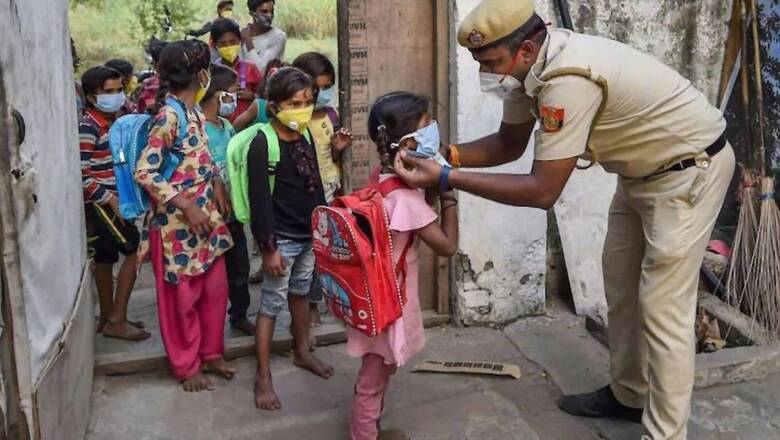
views
Experts, researchers as well as India’s Union Home Ministry have speculated that the third wave might impact children more than adults. One main reason for this speculation gaining ground has been the impact of the second wave, which saw a higher number of children contract the deadly virus.
Doctors say the surge of the more-contagious Delta variant, rising and sometimes serious cases in children and adolescents, and the start of the school year are prompting more parents to consider getting their children vaccinated.
The number of Covid-19 cases in children has steadily increased since the beginning of July.
Vaccines for children
The issue of vaccines for children has been at least partially resolved with the national drug regulator approving Zydus Cadila’s three-dose RNA vaccine for children over 12. A second vaccine – Bharat Biotech’s Covaxin – is expected to be approved by September.
Children between the age of 2 to 18 may be able to get vaccinated against Covid-19 by September this year, said Priya Abraham, the director of Indian Council of Medical Research (ICMR)’s National Institute of Virology (Pune). Phase 2-3 clinical trials for the vaccines are currently underway on children.
Guleria had earlier said that Bharat Biotech, Pfizer and Zydus vaccines for children will soon be available. “For children above two years of age, Covaxin from Bharat Biotech is under trial at Delhi AIIMS and five other hospitals and interim data is very much positive and encouraging. It will be available for children in September-October after final analysis of data,” he said.
Bharat Biotech has included children in its nasal vaccine trial. It is a one shot nasal vaccine.
Serum Institute CEO Adar Poonawalla earlier said on Friday that the Covovax vaccine for kids will be launched in the first quarter of the next year—most likely in January-February.
Children in the age group of 12-18 will be given priority in vaccination. The vaccines may be made available for children less than 12 years in different phases of time, depending on the results of the clinical trials. India will need at least 200 million doses to cater to the pediatric population.
According to a report by Economic Times, children over the age of 12 with underlying medical conditions are likely to be vaccinated first.
Highest unvaccinated children
India has the highest number of under-vaccinated or unvaccinated children worldwide at 3.5 million, an increase of 1.4 million from 2019, amid the COVID-19 pandemic outbreak, the UNICEF said. It also noted that over 3 million of zero-dose children in 2020 lived in India.
At nearly 4.4 million, South Asia recorded the highest number of children having failed to receive any routine vaccination in the past ten years, in 2020. “More than 3 million of these ‘zero-dose children’ in 2020 lived in India,” the United Nations Children’s Emergency Fund,(UNICEF) said in a statement.
India – particularly hard hit by the COVID-19 pandemic – had the highest number of unprotected children worldwide at 3.5 million, an increase of 1.4 million compared with 2019, when the number of unprotected children was 2.1 million, the children’s body said.
Unprotected children are those who are unvaccinated (no vaccine) or under-vaccinated (incomplete vaccination), that is, any child who has not received any or few doses of their due vaccination.
Third wave targets
A committee of experts constituted under the National Institute of Disaster Management (NIDM), set up on the directions of the Home Ministry, has concluded that the third wave of Covid-19 could peak around October.
The report has noted that “paediatric facilities — doctors, staff, equipment like ventilators, ambulances, etc. are nowhere close to what may be required in case a large number of children become infected”. The report has been submitted to the PMO.
Meanwhile, the group headed by NITI Aayog member VK Paul, in their recommendation shared with the government last month, has suggested preparing 23 hospitalisations for every 100 positive cases in a future Covid-19 infection surge.
This estimation is higher than the projection the group had made in September 2020 ahead of the second wave, when it calculated that about 20% of patients with “severe/ moderately severe” symptoms would require hospitalisation, The Indian Express reported.
Meanwhile, 4 children have died and over 300 were infected by Multi-System Inflammatory Syndrome-in Children (MIS-C), a post-Covid complication, in Kerala in the last five months, as per the state health ministry. MIS-C has emerged as a new concern for a state where a high number of Covid infections has persisted for more than two months.
Kerala chief minister Pinarayi Vijayan on Saturday asked parents to avail immediate medical help if MIS-C symptoms are seen in children. “It is a treatable disease, but if ignored, it will lead to complications,” he said.
Experts said MIS-C was a post-Covid disease among children with symptoms of fever, stomach pain, red eye and nausea surfacing three-four weeks following their recovery from the coronavirus.
Schools reopening
Schools across Delhi will be reopening soon. The expert panel formed by the Delhi Disaster Management Authority (DDMA) to look into the reopening schools in the national capital has submitted its report to the Delhi government.
“Children in India aren’t being vaccinated. If enough children fall sick, we don’t have good facilities to take care of them. Given our population size,we should be cautious. The fact is that a vaccine is now around the corner,” said Dr N.Trehan, Chairman, Medanta on reopening of schools.
Read all the Latest News, Breaking News and Assembly Elections Live Updates here.




















Comments
0 comment